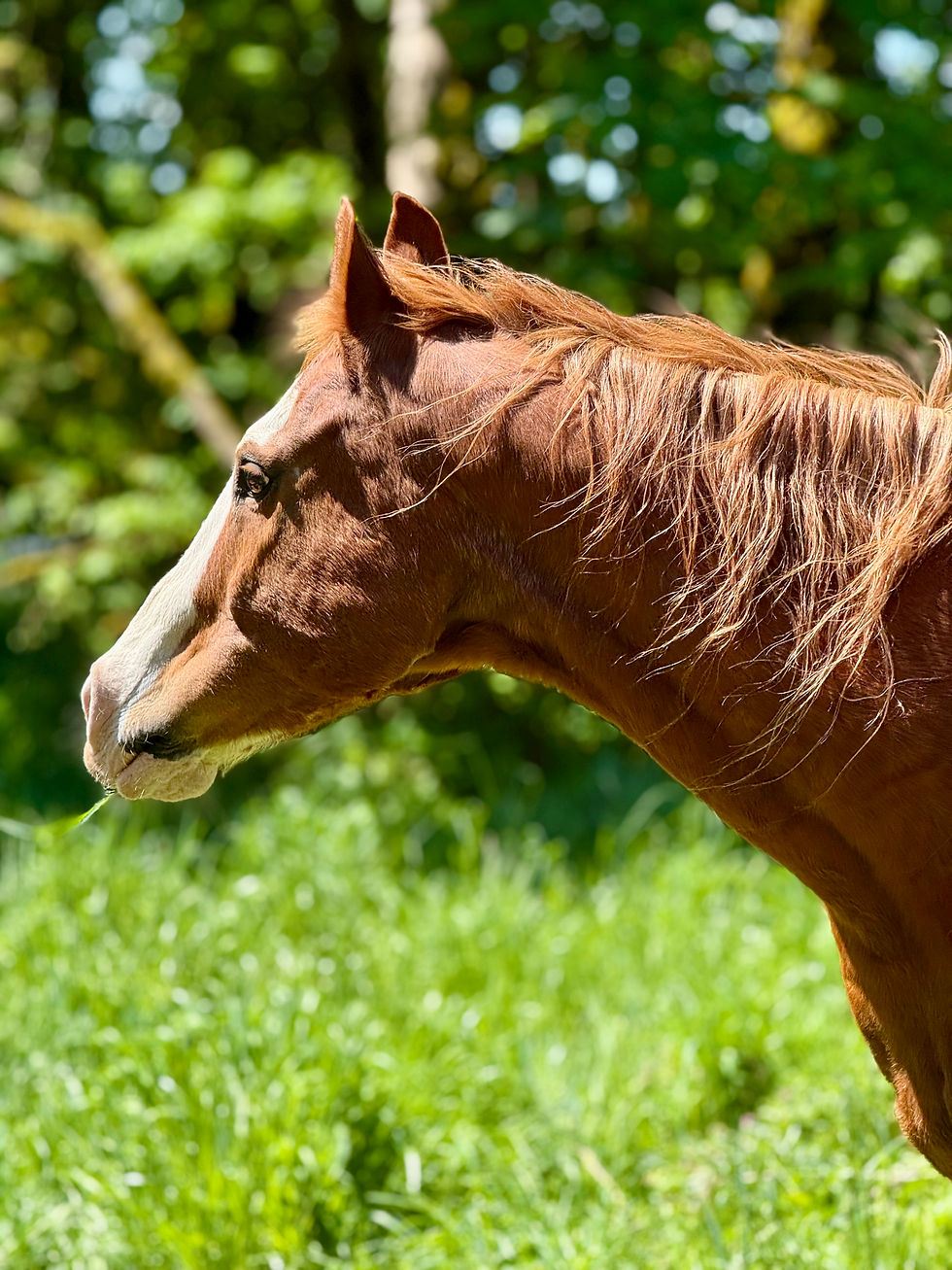Why Isn’t My Horse Gaining Weight?
- gabriellarson751
- Aug 1, 2025
- 3 min read
Updated: Dec 11, 2025
A Guide to Understanding Digestible Energy Requirements
Have you ever felt like your horse just isn’t putting on weight—no matter what you try? You’re not alone. Many horse owners struggle with this issue, often throwing various feeds, supplements, and strategies at the problem with little success.
We were in the same boat until we completed an Equine Nutrition course from Rutgers University, led by Dr. Carey Williams. What we learned has completely changed how we manage our horses’ diets—and we’re excited to share that with you.
Important Note: This article pertains to healthy horses that have been vet-checked and do not have metabolic disorders, insulin resistance, laminitis, or other underlying health issues. If your horse has a medical condition, consult with your vet before making any nutritional changes.
Every Horse Is an Individual
It’s easy to look for a one-size-fits-all answer, but equine nutrition isn’t that simple. Each horse is an individual—and their diet should reflect that.
Factors like body weight, workload, age, and even breed can affect how your horse uses and stores energy. That’s why it’s critical to pay close attention to your horse’s specific needs and not just follow generic feeding plans.
What Is Digestible Energy?
One of the most overlooked yet critical factors in a horse’s diet is Digestible Energy (DE). This is the amount of energy that your horse can actually absorb and utilize from their feed.
Just like people, horses burn energy for basic life functions, movement, temperature regulation, and work. If the energy they consume is less than what they burn, they’ll lose weight. If they consume more than they burn, they’ll gain weight—assuming there are no other health complications.
How to Estimate Your Horse’s Digestible Energy Needs
Every horse has a unique Digestible Energy Requirement, based on two key factors:
1. Body Weight (in kilograms)
2. Exercise Level (workload)
For example:
- A 1200 lb horse working 4 days a week will have very different energy needs than a 1200 lb horse that works just 1 day a week.
That’s why regular weight taping is so important. At our barn, we tape our horses monthly to monitor changes and make dietary adjustments if needed. (Check out our next article for a step-by-step guide on how to weight tape your horse.)
Using the NRC Digestible Energy Calculator
The National Research Council (NRC) offers an incredible online tool to calculate a horse’s Digestible Energy needs:
👉 NRC Nutrient Calculator: Nutrient Requirements of Horses - Working Doc
When using the calculator:
- Enter your horse’s current body weight
- Choose the appropriate workload
- Use 2% of body weight as a starting point for daily feed intake (mostly forage)
Once those fields are filled, the calculator will provide estimated Digestible Energy requirements (in Megacalories per day).
Need help using it? Reach out to us—we’re happy to run the numbers with you at no charge.
Matching Feed to Energy Needs
Now that you know your horse’s energy requirements, it’s time to look at what you’re feeding.
This is where things get more advanced:
Click on the Dietary Supply tab in the NRC calculator and input the actual nutritional content of everything your horse eats:
- Hay or pasture (requires a forage analysis)- Grain or concentrates (call the manufacturer for a feed tag or nutrition report)
As you input these values and adjust feed weights, the calculator will show you the energy balance at the bottom.
- If your horse is maintaining weight, aim to get as close to zero as possible—this means your horse’s energy intake matches its needs.
- If your goal is to help your horse gain weight, the Digestible Energy balance should be slightly over zero to ensure a calorie surplus.
- However, too far over zero can lead to other issues—such as excess fat, metabolic stress, or behavioral changes—so make increases gradually and monitor closely.
Always make changes in small increments, track weight monthly, and adjust as needed.
Final Thoughts
If your horse is struggling to gain weight, the answer may not be more feed—it may be smarter feeding. Understanding Digestible Energy is the foundation for developing a balanced, individualized diet that supports your horse’s health and performance.
At Horse Armor Nutrition, we’re committed to helping horse owners like you navigate these complex questions. Reach out anytime for help with the NRC calculator, choosing the right supplements, or interpreting forage tests. Because when your horse feels better, everything changes.

_edited.png)




Comments